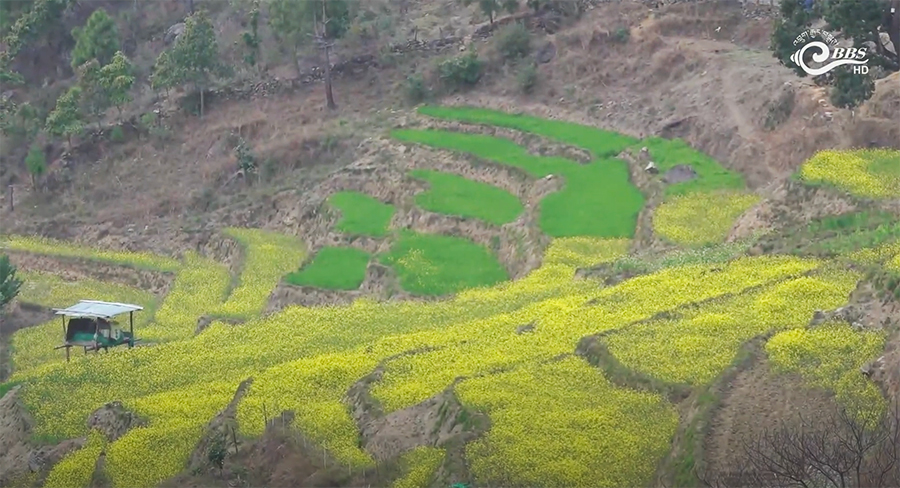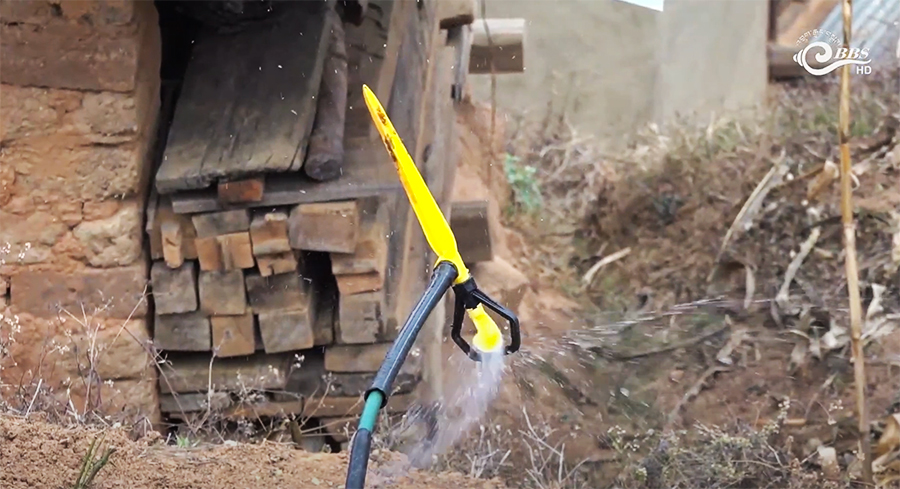 After more than a decade, winter cropping is making a comeback in Phangyuel Gewog, Wangdue Phodrang, thanks to the restoration of the irrigation water supply. Farmers have begun cultivating crops and vegetables, ensuring greater self-sufficiency. They say this has not only boosted summer agriculture but has also revived winter cropping, offering them new opportunities to improve their livelihoods.
After more than a decade, winter cropping is making a comeback in Phangyuel Gewog, Wangdue Phodrang, thanks to the restoration of the irrigation water supply. Farmers have begun cultivating crops and vegetables, ensuring greater self-sufficiency. They say this has not only boosted summer agriculture but has also revived winter cropping, offering them new opportunities to improve their livelihoods.
 The fields, once barren and dry during winter, are now flourishing. In the past, they were primarily used for cattle grazing. Today, nearly all paddy fields that were harvested last summer are covered in vibrant shades of yellow and green from mustard and wheat crops.
The fields, once barren and dry during winter, are now flourishing. In the past, they were primarily used for cattle grazing. Today, nearly all paddy fields that were harvested last summer are covered in vibrant shades of yellow and green from mustard and wheat crops.
The crops are still in the growing stage, but once harvested, locals will produce their vegetable oil, reducing dependency on the market.
Some farmers have already sold fresh produce like radishes and cabbage, generating income.
 Beyond agriculture, the irrigation supply has also alleviated livestock challenges.
Beyond agriculture, the irrigation supply has also alleviated livestock challenges.
In the past, farmers lost cattle due to dehydration, but with a reliable water source, both agriculture and livestock rearing have become more sustainable.
Goenkhar Chiwog Tshogpa Phub Dem said, “In our forefathers’ time, winter cropping was common. But for the past ten years, it has disappeared due to a lack of irrigation water. Now, we have resumed winter cropping with water from the Baychhu stream. This season, we focused on mustard after discussions with the community. Previously, our fields were left for cattle grazing, but that is changing.”
“I have not done much winter cropping in the past. This year, I cultivated wheat on about 75 decimals of land and attempted mustard but faced some challenges. I also grew and sold vegetables like spinach, radish, coriander, and onions, just as I do in summer,” said Namgay Tshering, a farmer.
“Before, we relied entirely on the market for vegetables during winter. Now, with access to irrigation, we are growing beans, mustard, spinach, and radishes. Even old chili plants have started fruiting again. We no longer need to buy everything from the market,” said Napo, a farmer.
 With the irrigation system in place, farmers are now able to cultivate maize twice a year, significantly increasing their income. Napo, for instance, earned over Nu 100,000 from maize production this year.
With the irrigation system in place, farmers are now able to cultivate maize twice a year, significantly increasing their income. Napo, for instance, earned over Nu 100,000 from maize production this year.
The project worth over Nu 550 M was completed last year with support from the UNDP and funded by the Green Climate Fund and the government. The gewog administration, with government support, distributed over 345 kilogrammes of mustard seeds to farmers, covering several acres of farmland.
Looking ahead, the gewog office plans to encourage farmers to cultivate income-generating fruit trees like oranges and cardamom to further boost their economic prospects.
Changa Dorji, Wangdue Phodrang
Edited by Kipchu







